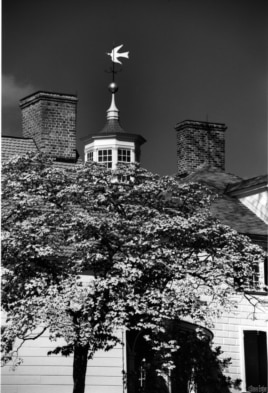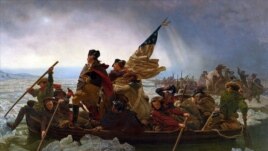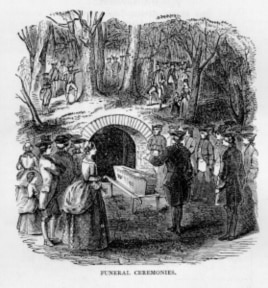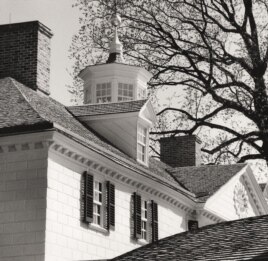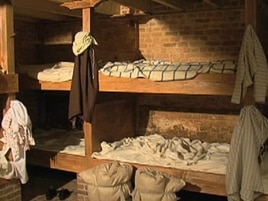From VOA Learning English, welcome to This is America. I’m Steve Ember. Americans are remembering George Washington this month. February 22nd marks the birthday anniversary of the country’s first president. Come celebrate the event with us on a visit to Mount Vernon, Washington’s home in Virginia.
George Washington lived at Mount Vernon for more than 40 years. The big wooden house is 24 kilometers south of Washington, DC -- the city named in his honor. But the distance from the city does not stop people from all over the world from visiting the home. The property can be reached by bicycle, car, bus – even by boat on the Potomac River.
George Washington was born on February 11th, 1731. His birth date moved up a year and 11 days when the Gregorian calendar was accepted. Before Washington was elected president, he commanded the troops that won the revolutionary war against Britain. He helped to set up the country now called the United States of America. Some historians say the nation would not exist if George Washington had never lived.
Washington helped choose where to build the capital city and an official home for the president. Yet he is the only president who never lived in the White House. It was completed after he left office. Washington lived in New York and later in Philadelphia while he served as president. But Mount Vernon was always important to him. And the house he shared with his wife Martha remains an important place in American history.
George Washington’s father, Augustine, started building the house in 1735. Later the home and farm were named “Mount Vernon.” At that time, George Washington’s half-brother, Lawrence, had the property. Lawrence Washington died in 1752.
George Washington took possession of Mount Vernon in 1754. During the next 45 years, he continually added to it. The main building grew to its present size of 21 rooms. He watched over the additions, even while he was away at war.
Today the house and property still look like a Virginia plantation, a working farm where crops are grown. But present-day Mount Vernon has been made more meaningful to visitors through many creative displays. A Hands-On-History Center offers special activities for children aged three to eight.
Visitors can begin their trip to Mount Vernon with a stop at the Ford Orientation Center. A film called “We Fight to Be Free” tells about Washington both as a man and as a military leader. The movie shows the future president commanding British forces during the French and Indian War, which ended in 1763.
Washington also led a small army across the icy Delaware River on December 25th, 1776. By that time, the American colonies were fighting for independence from Britain. Washington’s colonial forces were on their way to fight the Battle of Trenton, in New Jersey.
The colonial forces faced and defeated Hessian troops at Trenton. The Hessians were fighting on the British side. Many were captured, and the colonial losses were few. Winning the battle marked a turning point of the American Revolution.
The film also tells about Washington’s life in more peaceful times, like his first meeting with his future wife, Martha Custis. Her first husband had died and left her with four children. George and Martha Washington took the two youngest and raised them at Mount Vernon as their children.
The public loved George Washington for his service to the country. Some people wanted him to be president for life. But Washington said Americans had fought for freedom from such rulers.
He was elected president two times without opposition. He was offered a third term, but he refused. Washington said he wanted to return to the life he had led at Mount Vernon before the war.
And that is what he did. The former president returned to Mount Vernon. During those last years, he led the life of a rich farmer. He directed the work of five farms.
George and Martha Washington often invited friends to eat in the dining room at Mount Vernon. They also provided food and a place to sleep for travelers. Very few hotels existed then. So the Washingtons offered a place to stay to about 600 people a year. Many were strangers.
George Washington was able to enjoy retirement at Mount Vernon for less than three years. In December of 1799, the former president became sick and died. He was 67 years old. Modern doctors believe the cause of death was a severe infection.
Many people mourned. They felt a terrible loss at the death of their revolutionary war hero and first president. More than 700 speakers throughout the country honored him. Towns and villages held funeral marches. Businesses closed for days. Bells rang and rang.
Now that we know more about George Washington’s life, we will continue with our visit to his Mount Vernon home. The property contains the family’s main house and smaller buildings. Visitors also see farming areas, nature paths and – when in season – beautiful flower gardens. A green hillside leads down to the Potomac River.
A guide suggests going into the main house. It is three floors high. Washington was responsible for much of its design.
Today, the mansion has been restored to recapture the past. Step into the Central Passage, and you find yourself in the world of 1799. The Central Passage provides an entrance to the house. But it is more. It was a place for welcoming and entertaining visitors. A guide tells us that during summer months, the family gathered near the open doors in the hope of catching some cool air.
George Washington’s office is on the ground level. It contains many of his books. This is the room where Washington planned the farm activities on his land. It is also where he wrote to other leaders. One writer called this room, “the center of political intelligence for the new world.”
Another guide leads visitors up some steps. Mount Vernon has eight bedrooms. George and Martha Washington needed all these bedrooms for their many visitors. High above is a cupola -- a small structure with windows on all sides. Washington designed this so that hot summer air would escape from inside the house.
African slaves were responsible for a great amount of work at Mount Vernon. More than 300 slaves lived and worked on the property. Slaves and some paid workers operated George Washington's five farms. Together the farms covered more than one-thousand hectares.
Other slaves built houses and furniture. Still others cooked and performed housekeeping duties. Visitors can see the burial places of slaves at Mount Vernon. The cemetery holds the remains of slaves and free black people who worked on the property during the 1700s and the first half of the 1800s. Their final resting places are not marked.
Many years after the birth of the new country, America’s 16th president Abraham Lincoln signed the Emancipation Proclamation. The measure ended slavery in southern states, including Virginia. Lincoln’s action in 1863 was widely criticized as well as praised. Even in Washington's time, there was great debate about slavery.
Washington came to disapprove of slavery as he grew older. He was the only one of the men known as the Founding Fathers of the country to free his slaves. He ordered that his slaves be freed after he and his wife died. Older slaves received payments for years after that.
Much is said about George Washington the hero. But there is also the argument today that not enough is said about Washington the slave owner.
After George and Martha Washington died, Mount Vernon was given to other family members. By the 1850s, the individual who owned Mount Vernon did not have enough money to keep it in good condition. He offered to sell it to Virginia or to the federal government. Both said no.
That is when a private group rescued the home. The Mount Vernon Ladies’ Association bought the property with money it collected.
If you cannot visit Mount Vernon in person, you can explore it online. Go to the website, www.mountvernon.org . It lets you visit the world of a man who helped to build a new nation. And for pictures of Mount Vernon, go to our website: learningenglish.voanews.com.
Our program was written by Jerilyn Watson, and I’m Steve Ember, inviting you to join us again next week for another This Is America program from VOA Learning English.
For pictures of Mount Vernon, go to our website: learningenglish.voanews.com. Join us again next week for another This is America from VOA Learning English.
Loading lesson...
